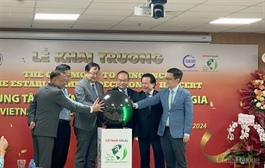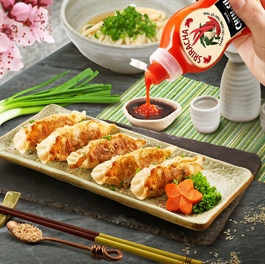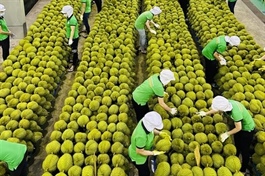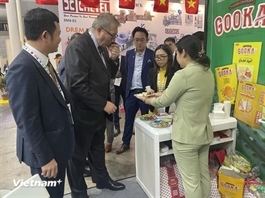Agricultural produce seeks to conquer e-commerce market
Agricultural produce seeks to conquer e-commerce market
E-commerce platforms are not only potential consumption channels but also create opportunities for fair competition for agricultural businesses to achieve higher export goals.

With the capacity to produce several thousand tonnes of clams each year, Minh Phu Trading and Services from the northern province of Thai Binh identifies both the domestic market and China.
Director Tran Ngoc Thuy said doing business on e-commerce platforms is in the interests of many businesses, and Minh Phu is no exception.
“Currently, there is still a lot of potential for consumption of clams in the Chinese market. We will take advantage of this opportunity to expand the market, increasing export output by five-fold by the end of this year,” Thuy said.
Before participating in e-commerce, each month Minh Phu could only export about 20 tonnes of clams to China. But since participating in the Vietnam booth on Alibaba.com from early last year, the company’s export capacity has tripled.
The Vietnamese agricultural products booth was born from cooperation between the Ministry of Industry and Trade (MoIT) and Alibaba, with the goal of introducing suppliers, promoting, and increasing consumption of Vietnamese products to the Chinese market.
E-commerce is an important channel for agricultural products, and is also one of eight priority areas for digital transformation to support farmers in improving product value and saving costs.
Vu Ba Phu, director of the Vietnam Trade Promotion Agency under the MoIT, said that every day, a Vietnamese supplier of agricultural and aquatic products on an e-commerce platform will have the opportunity to contact more than 450 new buyers each month.
“Suppliers through e-commerce will have the opportunity to connect with international customers, export to many new markets and thereby achieve outstanding growth,” Phu said.
According to Qi Ping, general director of Sunwah Gelafood Supply Chain Management, production capacity, quality products, and competitive prices are all factors helping Vietnamese agricultural products create a strong reputation with international customers, especially the Chinese market.
“Many Vietnamese products have changed their designs and packaging, improved their images, and met the standard requirements of export regulations. They are suitable for consumer preferences and needs on e-commerce platforms,” said Ping.
Sunwah Gelafood operates online and brick-and-mortar stores, under what is known as the Vietnam Pavilion on China’s public e-commerce platforms, e-commerce platform ASEAN Mall, physical stores, and Vietnamese warehouses in China.
Ping said that China was the country with the fastest e-commerce growth globally, with about 1.3 billion internet users and the highest number of people participating in online purchases and mobile payments worldwide.
“The scale of the Chinese e-commerce market is expanding. This is the path that Vietnamese export businesses can take advantage of to maintain their position as China’s largest trading partner in ASEAN,” she added.
Several bottlenecks
Although e-commerce is becoming increasingly popular, to achieve efficiency on these platforms, agricultural businesses still have difficulties that need to be resolved.
According to Pham Ngoc Anh Tung, founder of agricultural platform Foodmap, consumer purchasing decisions depend on convenience, price, and product brand. Although e-commerce meets these three factors, applying it to agricultural business, especially fresh vegetables, has many difficulties.
“In the fresh agricultural industry, the time from importing to sale is very short. If this time is extended, the quality of the product decreases. The best way to solve the problem is to have close coordination between units, from suppliers to shipping units,” Tung said.
Suppliers need to invest heavily in infrastructure, including cold storage and special transportation facilities, Tung added. “Delivery within three or four hours while still ensuring quality is a challenge for the fresh agricultural industry. In addition, predicting the number of goods to be sold compared to market demand is also critical.”
The challenge when doing business on e-commerce platforms comes from taking a lot of time to post products and update information. While each business will own many different products, each product has different detailed information.
“The ability to apply IT to smaller enterprises and cooperatives is still limited. Our problem is the lack of human resources that are knowledgeable about e-commerce, leading to ineffective maintenance of booths and reaching customers,” said Le Van Tam, director of Red River Agricultural Service Cooperative.
Meanwhile, Ping from Sunwah Gelafood commented that Vietnamese businesses need to learn about the purchasing preferences of each market to have effective ways to convey information and achieve better results.
“Short videos ranging from a few seconds to a few minutes, are a daily source of information favoured by nearly one billion Chinese people. In addition, the livestream sales model will promote direct sales and expand the consumer market more effectively,” she said.
Positive outcomes
According to the MoIT, Vietnam is becoming an important link in the global agricultural value chain, and is among the top 15 largest agricultural exporters in the world and second in Southeast Asia.
In recent years, the ministry has continuously cooperated with foreign e-commerce platforms to promote market diversity, support domestic agricultural enterprises to improve sales, and seek out the tastes of potential export markets.
In November 2023, the MoIT implemented the Vietnam Pavilion programme on Alibaba, in which agricultural products, food, and beverages have been in the top 10 best-selling items.
Last March, the One Commune, One Product (OCOP) Market initiative, under the framework of cooperation with TikTok Vietnam, successfully brought OCOP items and typical agricultural products of many localities to domestic consumers.
After one year, OCOP Market had witnessed more than 800 livestream sessions, bringing in more than $4.2 million in revenues and supporting more than 3,000 items.
Previously, the agency also cooperated with Amazon Global Selling to support Vietnamese businesses exporting goods on Amazon.com. The export value of Vietnamese businesses on the platform increased by 50 per cent last year, with about 17 million products sold to Amazon customers globally.
Although agricultural products are not yet in the top five best-selling items on Amazon, this platform predicts it will have a lot of room to continue growing in the near future.
In the domestic market, agricultural products of many localities are also regularly supported and promoted on major e-commerce platforms such as Shopee, Lazada, Sendo, and Postmart via the national online Vietnamese Pavilion programme, Vietnamese agricultural products market, and the annual Vietnamese agricultural products week.

























